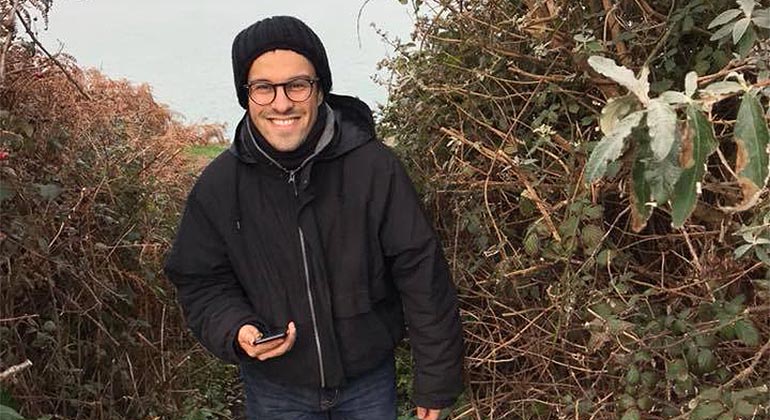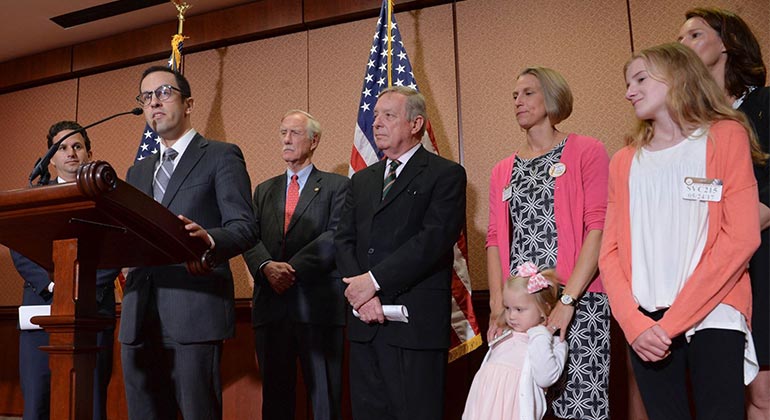

A Congenital Heart Disease Patient, and Activist, Puts His Trust in Mount Sinai
Four times is the charm for Michael Pernick—a congenital heart patient since he was born. “I am so grateful to Dr. Zaidi and the Mount Sinai team for giving me my life back,” says Michael, who is finally able to live the “typical thirty-something” life.
Michael was born with a heart defect called tetralogy of Fallot, which affects blood flow in the heart. He had his first open-heart surgery as a newborn, before he even left the hospital. He received a follow-up procedure a year later. His third open-heart surgery took place when he was 21. From an early age, Michael knew he would have a long-term relationship with his cardiologist. “It’s important for adults with congenital heart disease to continue to be followed by an adult congenital cardiologist for the rest of their lives,” he counsels. “Too many adults stop their care.”
After that third procedure, Michael became involved with the Adult Congenital Heart Association. For years, he went to Washington, D.C., with the association. He lobbied for funding for cardiology research and treatment. On one of these trips, in 2010, he worked with Ali N. Zaidi, MD, Associate Professor of Medicine and Pediatrics and Director of the Adult Congenital Heart Disease Center at Mount Sinai. Together, Michael and Dr. Zaidi spent a full day on Capitol Hill, speaking to senators and representatives about the Congenital Heart Futures Act. (The act was passed into law that year and renewed in 2018.) Michael became quite comfortable with Dr. Zaidi, and he decided that when he moved back to New York, in a few months, he would switch his heart care to Dr. Zaidi at Mount Sinai.
After a few years of seeing Dr. Zaidi, Michael noticed he was getting tired more easily and feeling heart palpitations. Dr. Zaidi determined that Michael’s pulmonary valve was significantly leaking. The valve needed to be repaired, but it was more a matter of the right time to intervene. When Michael started to feel more “winded,” they decided—together—that it was time to act. Michael was concerned because it had taken him months to recuperate from his last open-heart surgery, and he wasn’t looking forward to going through that again.
Fortunately, research and medicine have continued to advance over the past few decades. When the time came for Michael to undergo a valve replacement, Michael could have a minimally invasive procedure, instead of a fourth open-heart surgery. The interventionalist would use a thin tube to insert a transcatheter valve in his heart, to control the leakage. This transcatheter valve is a bovine jugular vein valve that is sewn into a platinum iridium stent and becomes a permanent part of Michael’s heart. Because the procedure is done in the cardiac catheterization lab and does not involve opening up the chest, there was minimal pain, a much shorter recuperation time, and early discharge from the hospital.
The successful procedure was performed in October 2019 by Barry Love, MD, Assistant Professor of Medicine (Cardiology), and Pediatrics at the Icahn School of Medicine at Mount Sinai, and Director of the Congenital Cardiac Catheterization Program at Mount Sinai Kravis Children's Hospital.
Michael spent two days in the hospital after the operation and was back at work two weeks later. He was able to keep up with his demanding career as attorney at the NAACP Legal Defense and Educational Fund. And not only can he sprint up a flight of stairs, but Michael can take strenuous hikes with no difficulties. He also serves on the Board of Directors for the Adult Congenital Heart Association. “The Mount Sinai team provided compassionate and meticulous care,” he says.
Michael has special words of praise for his Adult Congenital Cardiologist. “Dr. Zaidi is remarkable,” he says. “He combines compassionate and heartfelt patient care with unparalleled brilliance and thought leadership in researching new ways to diagnose and treat congenital heart defects. I’m lucky to be in his care.”